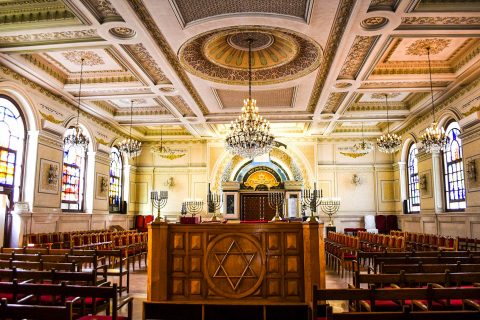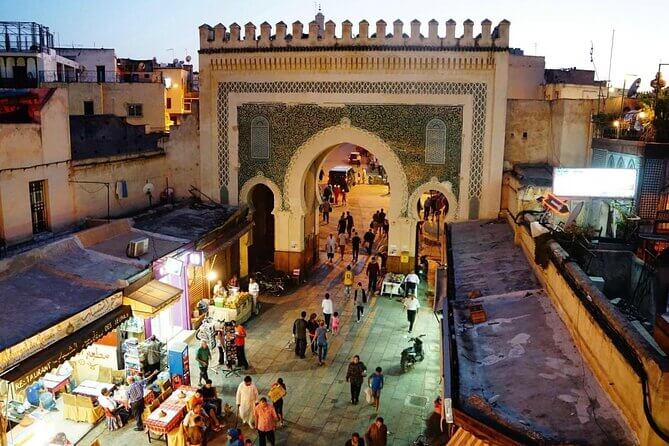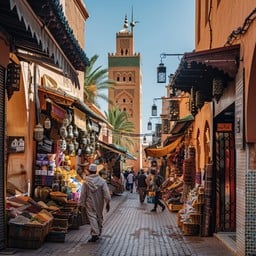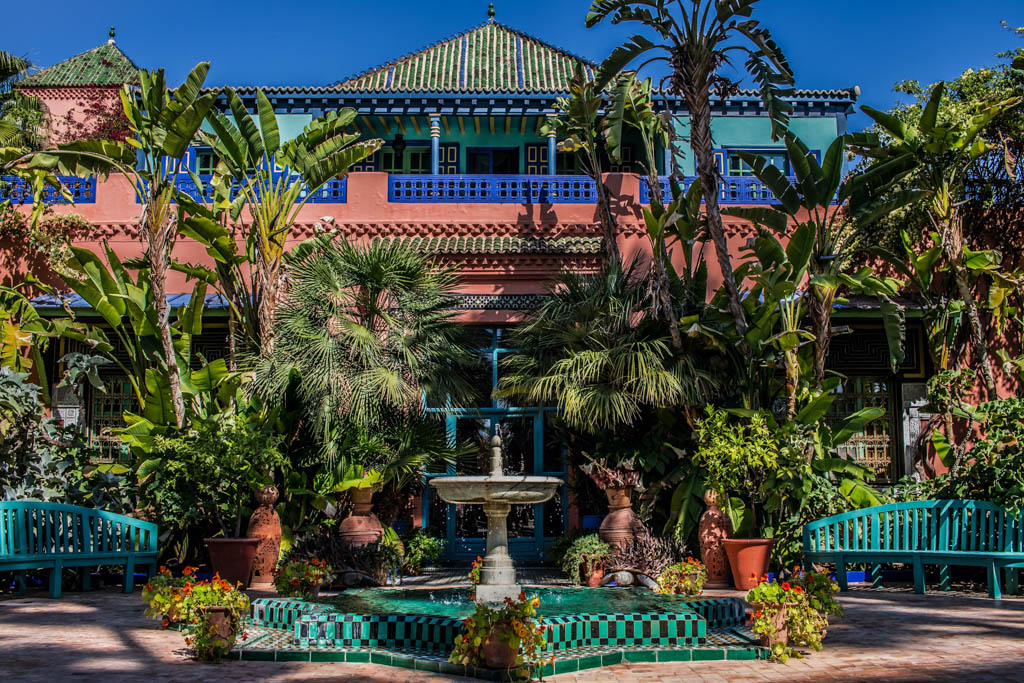Jewish Facets Of Morocco
More than elsewhere in the Islamic world, Moroccan Jewry was embedded within the land’s greater culture, sharing community, art, and ideas with neighbors and interweaving lives together in peace for centuries. Today, with hundreds of shrines, restored synagogues, the Museum of Moroccan Judaism (the only Jewish institution of its kind throughout the Muslim world), and the Fez “Mellah” (the Jewish quarter from the 15th century), the Kingdom of Morocco actively reserves and honors its Jewish past, from the Judeo-Spanish communities that lived in the north to Casablanca’s urban Jews and all the diverse Judeo-Arabic and Judeo-Berber traditions that once flourished on the North West coast of Africa.
In the 1950s, shortly after the state of Israel was declared, 250,000 Jews lived in Morocco — forming the then-largest Jewish community in any Arab-Muslim country. Only a few thousand Jews remain, yet remnants of the Jewish Moroccans — and their economic, social, and cultural contributions — can still be found throughout the country. In search of that legacy, we’ll view Hebraic epitaphs, see the tombs of the ancient rabbis (some known as “saints”), meet with leaders of today’s Jewish community, and much more. We’ll visit Morocco’s famous mosques, important museums, mausoleums of great dynasties, vibrant souks, and archaeological sites dating back to pre-Roman times. In addition, highlights of our trip will include a tour of Marrakech’s tropical Majorelle gardens and a lesson with a master of calligraphy, the most fundamental element of Islamic art, to learn techniques for drawing the Arabic alphabet. We invite you to join us as we explore the glories of Morocco while uncovering the rich Jewish culture that thrives within the Muslim world.
Fly into Mohammed V International Airport and make your way to your accommodation in Casablanca, a five-star luxury hotel just a few steps from the Old Medina market in the city’s historic center. In the evening, we’ll get acquainted with our fellow travelers, enjoy a welcome dinner, and receive an overview of our program and time together.
Morning: After breakfast, the day will start with a tour of Casablanca. We’ll visit Temple Beth-El, the centerpiece of the city’s Jewish community, and the Museum of Moroccan Judaism, the only museum of its kind throughout the Islamic world. Opened in 1997 by the Judeo-Moroccan Cultural Heritage Foundation, the museum was once a former orphanage for Jewish children that now explores the histories of the Jewish communities of Morocco and their many contributions to Moroccan culture.
We’ll break for lunch together at Le Cebestan Ocean View. Located beneath the Corniche lighthouse on the Atlantic coast, this almost 100-year-old restaurant with breathtaking ocean views offers fine Mediterranean cuisine using fresh fish and produce from the city’s local markets.
Afternoon: We’ll continue to explore the city, starting with a visit to United Nations Square, the point of connection between the Old Medina and the new city, between the past and the present. After, we’ll tour the narrow, maze-like streets of the Medina with remnants of the old city walls and forts. The bazaar is lined with tiny shops and artisans selling leather goods, oils, linens, shoes, spices, and antiques. We’ll see the opulent Mosque of Hassan II, one of the largest and most beautiful mosques in the world, and walk through the French-built Quartier Habous, known as the New Medina, before passing the Gates of the Royal Palace.
Morning: We’ll depart Casablanca for Fez, stopping along the way to visit Meknes to see its Old Medina and numerous tall and soaring minarets. One of the country’s four imperial cities, it was touted as the “Versailles of Morocco” after Sultan Moulay Isma’il, second ruler of the Alaouite dynasty, chose Meknes as his capital in the 17th century. We’ll visit the Mausoleum of Moulay Isma’il, a historic Islamic funerary complex with the sultan’s tomb located inside his former kasbah. Later, we’ll explore the narrow lanes and colorful courtyards of the city’s Mellah (Jewish Quarter), view Hebraic epitaphs dating back to the Christian era, and visit the tomb of Rabbi Benmidan, “the patron of Meknes.”
We’ll break for lunch and a wine tasting at Chateau Roslane, North Africa’s first vineyard and the country’s only château. Located between the gorgeous vineyard fields, the chateau’s L’Oliveraie restaurant presents the best organic Moroccan cuisine paired with wines from the surrounding crops.
Afternoon: We’ll continue to Volubilis, a UNESCO World Heritage site. One of Morocco’s largest and most important archaeological sites, Volubilis holds remains dating back to pre-Roman and early Islamic periods. Then, we’ll continue on to Fez, the most extensive medieval city in the Arab world and the home of Jewish scholars and rabbis for hundreds of years.
Evening: We’ll check in to the Fes Marriott Hotel Jnan Palace. Set in the heart of one of the biggest private gardens in Fes’s Ville Nouvelle (New Town), the hotel opened on the site of the former Jnane Palace. We’ll gather for dinner at one of the hotel’s fine restaurants — either L’Herbier de l’Atlas for regional cuisine or Dolce Vita for Italian fare.
Morning: We’ll explore the maze of streets, ancient mosques, minarets, and souks that make up this amazing ninth-century city. We’ll tour the Dar Batha Museum, a former royal palace commissioned by Hassan I, the 19th-century sultan, that is now a historical arts and crafts museum with over 6,500 objects before visiting Mederesa Bou Inania. Built in 1350–55 CE by Abu Inan Faris, it is the region’s only madrasa featuring a minaret and one of the few religious sites in the country open to non-Islamic guests.
Afternoon: We will break for lunch independently before continuing together to the Medina, a UNESCO world cultural treasure. We’ll view the house of revered medieval Jewish scholar Moses Maimonides, now a Chinese Moroccan restaurant. We’ll explore Nejjarine Square — one of the city’s most historic squares,
best known for the Najjarine water fountain — and the colorful tanneries spread out along the banks of the Oued Fez.
Morning: We begin the day at the Mellah (Jewish Quarter) of Fez, founded in 1438 and once home to tens of thousands of Jews. We’ll visit the Jewish cemetery, a white-washed expanse of graves that is the final resting place for some of the city’s legendary rabbis.
After lunch at a local restaurant, we’ll continue to the Ibn Danan synagogue, one of the oldest and most intact synagogues in Morocco, which dates to the 17th century. Built to serve the megorashim (Jews descended from those expelled from Spain), this beautifully restored building even includes a mikvah. Finally, we’ll visit the nearby El Fassiyeen synagogue, also constructed in the 17th century. When the refurbished building reopened ten years ago as a cultural center, Morocco’s prime minister read a message from King Muhammad VI praising the Jewish community and pledging to protect it.
Evening: Enjoy a Shabbat dinner together at the hotel.
We are free to enjoy a leisurely Shabbat or explore the neighbourhoods of Fez on our own. An optional afternoon walking tour will be offered.
Morning: We’ll drive to Rabat, the capital city resting along the Atlantic coast. We’ll enjoy views of the Moroccan countryside and stop for lunch along the way.
Afternoon: We’ll marvel at the ancient necropolis of Chellah, a UNESCO World Heritage site. Once a thriving city for nearly 1,000 years, it houses both Roman and medieval Muslim ruins, including a medieval Muslim cemetery. Later, we’ll roam the streets and gardens of the Kasbah des Oudaias, originally built in the 12th century. Finally, we’ll visit the Mausoleum of Mohammed V, a masterpiece of modern Alouite dynasty architecture that holds the remains of three royal family members — the King Mohammed V and his two sons, King Hassan II and Prince Abdallah.
Morning: We’ll depart Rabat for Marrakech. Upon arrival, we’ll visit the beautifully tiled minaret of the Koutoubia Mosque, the Red City’s largest mosque, which is also known as the “Mosque of the Booksellers.”
Afternoon: After lunch, we’ll check into the modern Les Jardins de la Koutoubia in the vibrant Gueliz quarter, just steps away from the Hivernage neighborhood and ten minutes from the traditional
souks. Once settled in, we’ll walk to the nearby Djemaa el Fnaa Square, a UNESCO Masterpiece of World Heritage site that brings urban legends and oral history to life nightly with the local performers: fire jugglers, musicians, dancers, fortune tellers, and storytellers.
Evening: We’ll have dinner together at Dar Moha, one of the city’s finest restaurants serving authentic Moroccan cuisine, set in a riad (traditional Moroccan house with an interior garden).
Morning: We’ll head to the historic Mellah of the old city and the Slat al-Azama Synagogue — originally built in 1492 AD and considered the city’s oldest temple — to meet with leaders of the Jewish community. We’ll then tour the Musee de Marrakech, housed in a 19th-century Menebhi Palace, and view its mosaic tile work and display of ceramics, followed by the Dar Bellarj Foundation, an institution dedicated to protecting and showcasing Moroccan culture. Finally, we’ll visit the brilliant 19th-century Bahia Palace filled with floor-to-ceiling extravagance, including intricate marquetry, plasterwork, and zouak (painted wood). At Dar Cherifa, a late 16th-century house in the Medina and one of the few well-preserved houses from the Saadian period, we’ll have refreshments and enjoy some delicious local delicacies. A Calligraphy master will join us for tea and share the techniques of drawing the letters of the visually exquisite Arabic alphabet.
Afternoon: After lunch (included), we’ll tour the famous souk, Marrakech’s bustling open-air market that gives each trade, including spices, carpets, jewelry, enamel, copper, brass, and more, its own unique quarter. Sights may include villagers bringing their handmade rugs to sell or artisans selling hand-tooled crafts made in the same traditional ways for centuries.
Morning: We’ll set out for the lush, green Ourika Valley, where the temperatures cool in the shadow of snowcapped High Atlas peaks. We’ll visit the tomb of a tzadik, Rabbi Shlomo ben Hensh, who died 500 years ago but is still revered as a saint by both Muslims and Jews.
Afternoon: We’ll have lunch at a local restaurant before returning to Marrakech for the remainder of the day. Guests will have dinner on their own and will be free to enjoy a leisurely evening or explore the city.
Morning: To begin our final day together, we’ll journey to the tropical Majorelle Gardens, a botanical and artist’s landscape
garden. Created in 1923 by the French artist Jacques Majorelle, the garden was restored under the patronage of the late fashion designer Yves Saint Laurent. From there, we’ll move on to another UNESCO World Heritage site, the opulent Saadien Tombs, the mausoleum of the great dynasty that once ruled North Africa in the 16th century.
Afternoon: After lunch on our own, the afternoon is free for guests to explore Marrakech.
Evening: Our farewell dinner is at the luxurious Dar Yacout. Waiters in white djellabas and red fezzes serve traditional dishes in a stunning setting deep in the Medina.
Our tour reaches an end today. Transfer to the airport for your home bound flight.
Services
Includes
- Entrance fees of the scenic spots as listed in the itinerary.
- Meals as specified in the itinerary.
- Meeting and assistance on arrival or departure and all needed transfers at airport/hotel/station/ferry as per itinerary.
- Sightseeing or activities as listed in the itinerary.
- Accommodation with daily breakfast.
- Private transfers between airports, hotels and scenic spots while sightseeing
- Bottled water on sightseeing days
- Service charges: Our offer includes the planning, handling, operational and communication charges & current VAT Taxes.
Important Notes
Check-in after 2:00 pm & Check-out before 12:00 pm. Early check-in or late check-out is subject to room availability and may generate additional full-day room charges. * In some remote or protected areas in Africa, such as Uganda, solar power is the main source of energy which is not suitable for using Air Conditioners at their lodges, and they will provide fans in the room, and in fact, air-cons are not necessary in these National Parks or Reserves.
In case of snowing during November and February in the High Atlas Mountains, we would drive slower than usual to ensure safety. In this case, you may reach Erfoud later than expected. If snow blocks the road, we will stay in Midelt for the night, and head further south the following day. Though mostly clear days, winds are unpredictable in the desert area. And even luxurious tents are not totally sanding-proof on windy days. If you would like to return to the Erfoud hotel for the night, we could arrange it upon the availability of hotel rooms.
Your passport should be valid for a certain period beyond your intended stay in the destination country. The required validity can vary. Six months beyond your planned departure date from the destination country is a common requirement. And ensure you have at least 2 blank pages for visa stamps. Visa requirements vary from country to country; please consult your travel consultant for more details if you are unsure whether a visa is required for your trip.
Pick ups in each city or area via private air-conditioned vehicle as listed in the itinerary. Appropriate size vehicles will be used according to the number of your group to ensure you have enough leg room and luggage space. Please be aware that the arrival or departure transfer is based on all members arriving or departing on the same flight, additional cost will be charged when arriving or departing on different flights and separate transfers.
Spring (March – May) and autumn (September – October). Coastal areas such as Essaouira remain pleasantly warm and not too hot in summer (June – August). The Mediterranean north is pleasant in spring and summer.
We arrange an English-speaking driver for the entire trip. Whilst you tour at Fez and Marrakech, we will arrange private English-speaking guides on sites, and your driver will be in charge of driving you from site to site and city to city, of course, your driver is also able to give you general information on Morocco. On your request, we are also able to arrange a private tour guide throughout the entire Morocco trip with a supplement.
Ramadan is an annual month-long festival, during which travel can be a rewarding cultural experience, however some regular services may not be available during the day, such as restaurants or cafes, and occasionally travel can be disrupted by events. Your leader will adjust the itinerary accordingly, but please consider this when selecting your travel dates. You’ll find dates and further information in the ‘Climate and seasonal information’ section of the Essential Trip Information.
There are a couple of long travel days on this trip, particularly the day travelling to the Sahara Desert. Rest stops will be made on the way and you’ll be rewarded with great views on the drive itself.

































































